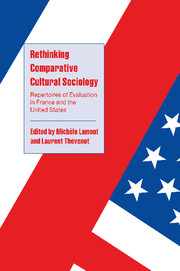Book contents
- Frontmatter
- Contents
- Notes on contributors
- Acknowledgements
- 1 Introduction: toward a renewed comparative cultural sociology
- Part I Race, gender, and multiculturalism
- Part II The cultural sphere: publishing, journalism, and the arts
- 5 Culture or commerce? Symbolic boundaries in French and American book publishing
- 6 Involvement and detachment among French and American journalists: to be or not to be a “real” professional
- 7 From rejection of contemporary art to culture war
- Part III Political cultures and practices
- Conclusion: Exploring the French and the American polity
- References
- Index
5 - Culture or commerce? Symbolic boundaries in French and American book publishing
Published online by Cambridge University Press: 26 March 2010
- Frontmatter
- Contents
- Notes on contributors
- Acknowledgements
- 1 Introduction: toward a renewed comparative cultural sociology
- Part I Race, gender, and multiculturalism
- Part II The cultural sphere: publishing, journalism, and the arts
- 5 Culture or commerce? Symbolic boundaries in French and American book publishing
- 6 Involvement and detachment among French and American journalists: to be or not to be a “real” professional
- 7 From rejection of contemporary art to culture war
- Part III Political cultures and practices
- Conclusion: Exploring the French and the American polity
- References
- Index
Summary
Book publishing is a particularly fertile ground for the comparative study of how people construct and use classification schemes in their evaluation processes. The main activities of book publishing revolve around a core set of decisions which are firmly rooted in underlying assessments of worth about what to publish and why. Moreover, the sector as a whole and its inhabitants are the focus of debates over the status of books in an age of multimedia, global information technologies, industry consolidation, and shifting cultural hierarchies among large segments of the reading public. Publishing professionals are presently confronted with unprecedented opportunities and threats, their positions and role-expectations are changing, and their daily tasks and responsibilities are in flux. The contemporary transformation of book publishing creates an unstable terrain of new conflicts and compromises which are inextricably bound to the edification and defense of symbolic territories and boundaries.
This study examines the book publishing communities in France and the United States in order to understand how publishers evaluate and classify the realm of literature and ideas. In general, I will identify the criteria used to construct symbolic boundaries, that is, the lines publishers sketch when they categorize literary and intellectual work. A primary focus of the research is on the rhetorical language used to define “worthy” and “less worthy” books, authors, genres, and contemporary cultural tendencies. A secondary goal is to clarify the criteria mobilized by publishers to characterize professional peers and perceived readers of different kinds of books.
- Type
- Chapter
- Information
- Rethinking Comparative Cultural SociologyRepertoires of Evaluation in France and the United States, pp. 127 - 147Publisher: Cambridge University PressPrint publication year: 2000
- 13
- Cited by



